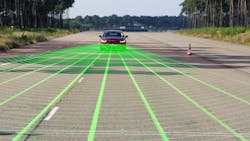Indeed, Daniel McGehee (seen at right) – the director of the transportation and vehicle safety research division at UI’s Public Policy Center – noted that that fully 40% of the drivers in this poll reported that their vehicles “acted or behaved in unexpected ways,” reinforcing the “uncertainty among drivers” about how many vehicle safety technologies function.
"As technologies like rear-view cameras and lane departure warning systems advance and become more prevalent in the cars we're driving there is a tremendous need to improve consumer understanding of these critical safety features," McGehee said.
UI’s survey found that a majority of respondents had heard of, been exposed to, or interacted with at least one of the nine vehicle safety features:
- Back-up cameras, which provides a view of the area directly behind the car when the vehicle is in reverse.
- Blind spot monitoring that alerts drivers when there may be something located in their blind spot.
- Forward collision warning that warns drivers when they are closing in on the vehicle ahead too quickly.
- Anti-lock braking systems (ABS), which helps prevent wheels from locking up, helps avoid uncontrolled skidding and provides some steering control in slippery conditions like snow.
- Rear cross traffic alert technology that provides an alert to the driver that traffic is approaching from the left or right when the vehicle is in reverse.
- Adaptive cruise control, which maintains driver-set vehicle speed as well as a pre-set following distance.
- Automatic emergency braking systems that automatically applies moderate to hard braking when the system detects that a collision is imminent.
- Lane departure warning, which alerts drivers when they drift into another lane when the turn signal is not activated.
- Traction control, which works in the background to help accelerate and prevent wheel slippage (or "over-spinning") when driving on slippery surfaces.
However they were also unsure about how features long standard on vehicles for years, such as anti-lock braking systems and tire pressure-monitoring systems, worked as well, McGehee noted.
To change that, UI partnered with the National Safety Council (NSC) to launch MyCarDoesWhat, a national campaign aimed at educating motorists about the safety technologies in their vehicles and how they work – with a website, MyCarDoesWhat.org, loaded educational videos and other information about safety systems designed to help avoid or reduce the severity of a vehicle crash.
"The level of confusion about features that have been standard in American cars for quite a while was really surprising," UI’s McGehee stressed. "The little details about how some of these systems work are really important when we're talking about safety. We need to do a better job of making sure consumers are comfortable with them."
Maybe that, in turn, might help forge more significant reductions in vehicle crash fatalities and injuries, which is why all of those technologies were designed – and in some cases mandated by law – to be put on vehicles in the first place.





